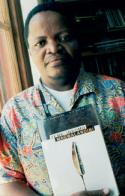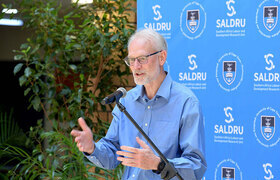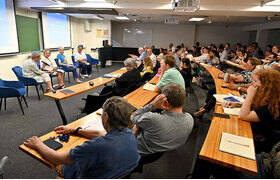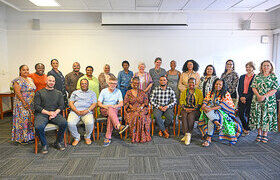Xhosa text returns after 90 years
24 February 2003 Comeback book: UCT's Prof Sizwe Satyo has orchestrated the re-release of Zemk' Inkomo magwalandini, a collection of Xhosa poetry, clan praises, essays and proverbs first compiled by Dr W Benson Rubusana in 1906.
Comeback book: UCT's Prof Sizwe Satyo has orchestrated the re-release of Zemk' Inkomo magwalandini, a collection of Xhosa poetry, clan praises, essays and proverbs first compiled by Dr W Benson Rubusana in 1906.
THE PUBLICATION of Zemk' Inkomo magwalandini, a collection of Xhosa poetry, clan praises, essays and proverbs first compiled by Dr W Benson Rubusana in 1906, is an important milestone for UCT's Professor Sizwe Satyo. Satyo not only orchestrated the re-release of the book, but is also convinced that the text still holds many lessons for South Africans.
Rubusana, the first African member of the Cape Provincial Parliament as well as poet, newspaper columnist and church minister, put the book together – with contributions from African leaders, politicians, teachers, and others – in an attempt to debate the “conflict†between modernism and traditional African values. He published the book in 1906.
The collection was last printed in 1911.
According to Satyo, based in the Department of Southern African Languages, the original Zemk' Inkomo magwalandini – its name means "There goes your heritage, you cowards" – signified the early start of an intellectual struggle against colonial authority. “After a few military defeats, Rubusana and other writers decided that the best thing would be to continue the fight through the pen rather than the spear,†he says.
The volume's “Great Discussions†on the contrasts between Christianity and traditional African beliefs, on African customs and on historical events, provide a wealth of material for lecturers and teachers of history, cultural studies and language, he adds.
“It can even teach a couple of our members of parliament something about the art of debate.â€
Satyo's fascination with the text stems back to his days as examiner with the Joint Matriculation Board, when he would often extract pieces from the book for comprehension passages. More recently, he began work on an English commentary of Zemk' Inkomo magwalandini.
Realising that it would be useful to actually have the book in print, he began organising its publication with New Africa Education Publishers. As editor, he also penned an introduction, in Xhosa, for the collection.
In addition, Satyo is considering the daunting task of translating the voluminous work into English, possibly in several stages and volumes.
 This work is licensed under a Creative Commons Attribution-NoDerivatives 4.0 International License.
This work is licensed under a Creative Commons Attribution-NoDerivatives 4.0 International License.
Please view the republishing articles page for more information.
Related
A humanising lens on transformation at UCT
17 Dec 2025
A fond farewell to prof of the people
15 Dec 2025










